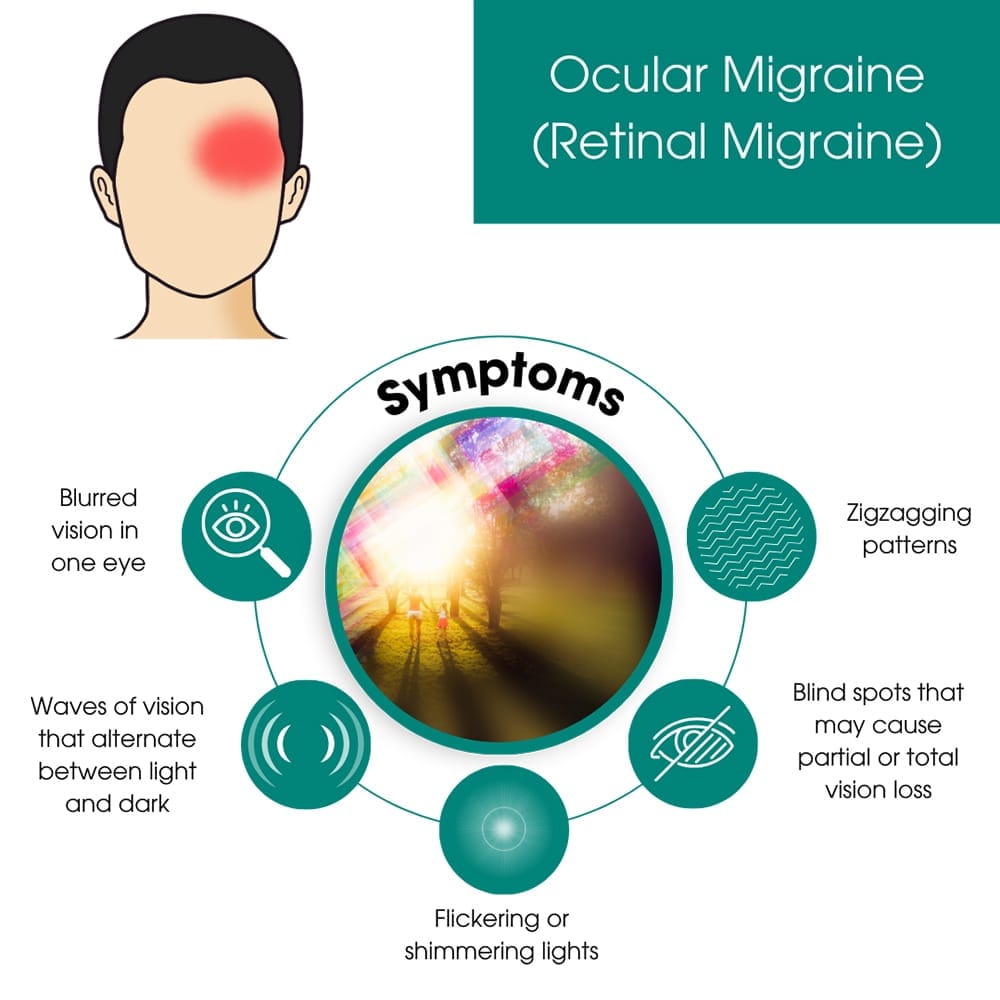If you’ve experienced flashes of light in one eye or temporary blind spots that last an hour or less, you may have experienced an ocular migraine, also called a retinal migraine, optical migraine or eye migraine. A retinal migraine is a rare condition that may precede or accompany a full-blown migraine headache and may sometimes occur without a headache. It usually affects one eye, not both.
Sudden visual changes or any level of vision loss should always be evaluated by an experienced optometrist as soon as possible. Eye Physicians offers comprehensive eye care in NYC and is the best choice for both routine and emergency eye care in the Manhattan area.

The symptoms of an optical migraine vary from one person to another, and vision changes may or may not include pain.
The most common symptoms of an ocular migraine include:
If you have blind spots, they may get bigger as the migraine goes on. There may be a wide range of visual symptoms including images that are fractured, bright in color and contain repeating geometric patterns. The symptoms of an optical migraine usually pass within 60 minutes and your vision returns to normal.
Since attacks of retinal migraines are brief, you may not be able to see your eye care professional during an attack, but symptoms should be evaluated to rule out something more serious. To determine if you have retinal migraines, your eye doctor does a thorough examination which includes reviewing your symptoms and your family medical history. Your NYC eye doctor may diagnose ocular migraines by ruling out other possible eye disorders.
The exact cause of retinal migraines is unknown, but many researchers theorize that it may be related to blood flow issues involving the retina. Retinal migraines may be set off by the same things that trigger migraines.
Examples of triggers include:
Certain foods can trigger migraines such as alcohol, artificial sweeteners and processed meats that contain nitrates. In some people, migraines are associated with caffeine withdrawal. Ocular migraines can affect people of all ages but are most common between the ages of 20 and 40.
Retinal migraines start in the retina, behind the eye. They sometimes include a headache behind one eye, but headaches behind one eye don’t always indicate a migraine.
If you experience a headache behind the right eye or behind the left eye, it may be a sign of different conditions such as:
Inflamed sinuses can trigger pressure or pain behind one or both eyes. When you have a retinal migraine, the headache pain that follows may be throbbing, pounding or pulsing and is usually located behind the affected eye.
An ocular migraine isn’t the same thing as a migraine with aura. A migraine aura starts in the brain, not the eye, and it’s common for a migraine with aura to affect your vision.
Characteristics of a migraine with aura include:
The symptoms of a migraine with aura last longer than the symptoms of a retinal migraine and can last well over an hour. The visual disturbances that go along with a migraine with aura are temporary but can interfere with your daily activities until symptoms pass.
Ocular migraine treatment may not be needed if you don’t experience retinal migraines frequently, such as less than once a month.
If your symptoms occur frequently, retinal migraine treatment focuses on reducing the frequency of your attacks, which may include:
To find the lifestyle changes that may be most beneficial in preventing ocular migraines, it may be helpful to keep a journal of when retinal migraines occur and what may have triggered them. If lifestyle changes don’t relieve symptoms, your doctor may prescribe medications such as antiepileptics, antidepressants or calcium channel blockers. If you have migraine aura with a headache, your doctor may prescribe medications that help to block the sensation of pain.
To keep your eyes healthy and your vision clear, it’s important to have regular eye exams. There are some symptoms that may be signs of a serious problem relating to your vision or overall health, which should be evaluated immediately by an experienced NYC eye doctor.
These include:
Ocular migraines aren’t usually dangerous, but the symptoms of optical migraines can mimic other more serious conditions so if you’re having blurry vision, blind spots or are seeing floaters or flashing lights, it’s important to have an evaluation by an eye professional. Contact the experienced ophthalmologists and optometrists at Eye Physicians for any concerns affecting your vision or eyelids. For the best eye care in NYC, schedule an appointment at Eye Physicians today.
Eye Physicians
110 Lafayette St, Suite 503
New York, NY 10013
(212) 292-4814
Entrust the care of your precious eyesight to highly skilled and experienced eye care professionals. For top-notch ophthalmologists and optometrists in Downtown Manhattan, choose Eye Physicians. Eye Physicians ensures prompt care, precise diagnosis, and personalized treatment plans.
Schedule an Appointment